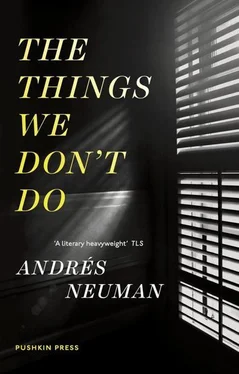WHEN I REALIZED I would be mortal like my father, like those black shoes in a plastic bag, like the pail of water where the mop wiping down the hospital corridor was dipping in and out, I was twenty. I was young, so old. For the first time I realized, as the trails of brightness slowly cleared from the floor, that health is a very thin layer, a thread that vanishes with each passing step. None of those steps was my father’s.
My father always had a strange walk. Swift and clumsy at the same time. When he began one of his walks, you never knew if he was going to trip over or break into a run. I liked his way of walking. His hard, flat feet were like the ground he stepped on, the ground he fled from.
My father now had four flat feet, in two different places: in the bed (joined at the heels, slightly open, evoking an ironical V for victory) and inside that plastic bag (imprinted on the leather, as a kind of reminder on his shoes). The nurse handed them to me the way you hand someone scraps. I looked at the tiled floor, its shifting squares.
I sat there, in front of the doors to the operating theatre, waiting for the news or dreading the news, until I took out my father’s shoes. I stood up and placed them in the middle of the corridor, like an obstacle or a border or a geographical accident. I positioned them carefully, so as not to disturb their original contours, the protrusion of bones, their absent forms.
Soon afterwards, the nurse appeared in the distance. She came down the corridor, skirted round the shoes and continued on her way. The floor was gleaming. Suddenly cleanness frightened me. It seemed to me like a disease, a perfect bacterium. I squatted and moved along on all fours, feeling the scraping, the hurt in my knees. I put the shoes back in the bag. I pulled the knot as tight as I could.
Occasionally, at home, I try on those shoes. They fit me better each time.
THE ASHTRAY WAS FULL. Luis was holding his gin and tonic like a transparent sceptre. The ice cubes had melted in his glass. A ball of wax, the sun was pulsating high in the sky. Amid laughter, Luis ordered another round. That’s enough for me, thanks, I said. Luis insisted noisily. I shrugged. I lit a cigarette, we sat in silence, and then I heard someone calling us.
It was a sing-song voice that gradually became stronger, more defined as it drew closer. A familiar voice. We both turned at the same time: fresh from the sea, Anita was waving at us. She quickened her pace, or rather she slowed down first, raised her hands to her hair, tossed it back, and then ran towards us.
She kissed her father on his unshaven cheek. She said “Hello” to me with a smile. I hadn’t seen Anita since the previous summer. Her hair was longer than I remembered. She smelled of salt, waves, mint chewing gum. The sun had burnt her cheeks and the tip of her nose. She was wearing a red bikini with very thin straps. While Anita was hugging her father’s neck, I stared at the thick blonde down on her arms.
Daughter, Luis said to her, shouldn’t you be more careful in the sun? Oh, Papa, I’m still white, she answered, stretching out a leg. But you’re tanned enough already, Anita! protested Luis. Anita laughed, let go of his neck and said, glancing at me out of the corner of her eye: That means I need a bit more. Would you like a Coke? Luis offered. Thanks, Papa, but I can’t, she said, shrugging her shoulders, I’m going out soon and I have to go home first and change. What a shame, Luis sighed, downing his gin and tonic. Laughing a second time, Anita stood, arms akimbo and said: My dear papa, you wouldn’t be trying to blackmail me, would you? Luis looked at me in astonishment, recovered his light-hearted expression and said: Well then, give me another kiss. Anita leaned over to give him one.
The three of us engaged in light conversation for a few minutes. Luis took the lead, and seemed in a good mood. He was drawing out the situation, I guessed, in the hope that his daughter would relent and stay with us. Yet she remained standing next to our table, responding to us with perfect politeness but with a succinctness that suggested urgency, that set a limit.
Before saying goodbye, she asked Luis not to smoke so much. I lit another cigarette. She blew us a kiss with both hands, moved away from the parasol and emerged into the sunshine. I watched how she walked off, her unruly hair, the swaying of her medium-sized hips, the red triangle of her bathing suit as she grew smaller in the distance. Luis bit his lip. Silence came over us once more. The sunlight rotated on Anita’s skin, like someone pointing a mirror at her back.
I AM WRITING THIS so as to put time in order. There is nothing more disorderly than failing to write down events. And, of late, things at home are utterly disordered.
My mother has just brought me breakfast. Her smile is so identical from one morning to the next that I am beginning to suspect she doesn’t notice the days go by. Perhaps she is living in a continuous past that has ousted the present? It would be a clever way of evading the future, which doesn’t offer her much hope. I love my mother dearly.
My father’s case is different. Not because I don’t love him, but because neither of us has managed to put ourself in the place of the other. It’s ironic: in order to be able to say this I have had to put myself in his place. That is precisely why I am writing this, I keep saying, I keep telling myself. If I don’t discuss the matter with myself, I can’t understand who occupies what place. My father is a different case because he works, and he has his world, so to speak, outside our world. He inhabits the house in a way that is healthier because he isn’t really here: he comes to visit us and disappears. Moments before he is due to leave, I notice how contented he becomes. He is in such excellent spirits that it is a pity, he would seem to be saying, that he has to go to his consulting room. But that’s what duty to one’s patients is about, and so on. How much of this does Mama notice? Mystery. She smiles and prepares my breakfast.
And me? I don’t speak much to my father, I am far too silent with my mother and I am ashamed to confess I continue to avoid household chores. I have just turned thirty-three and still live at home. Put baldly like that, it already sounds like a reproach.
What further introspective insights could I make about myself? Lots, but not now. I have to read over my latest reports, make notes and copy everything out before my session with José.
Monday 30 April. The situation sometimes appears to be at an impasse. I don’t know whether to interpret this as a failure or a minor victory. I try to cheer myself up with the thought that, without me the patient would be worse off. This consolation doesn’t last long. The time it takes me to tell myself that others more experienced than I would perhaps have made better progress.
Juan continues to insist on behaving as if his parents were alive. As simple and terrifying as that. In his eyes they are still there; nothing at home has changed. Every so often, I carefully try to oppose that impression. In the main, I am content to listen, waiting for some kind of reaction from him. When he contradicts himself in this matter, I try to give him a knowing look. He interprets this as my agreeing with him.
There isn’t much advice you can offer someone who has been orphaned. But one thing is obvious, and occasionally I let it slip: Juan should have moved a long time ago. To leave that house and everything it represents, its unforgotten furniture. As Bachelard says, there are spaces that are a time. That is Juan’s problem: he doesn’t move out of that space and time doesn’t move on for him. Despite the development of his pathology, I realize that basically his conflict is no different from the usual model. That is to say, faced with normal pain, he has responded abnormally. Or perhaps not even that: he has responded in a classic manner, but has taken all the processes to such an extreme he has become ill.
Читать дальше












